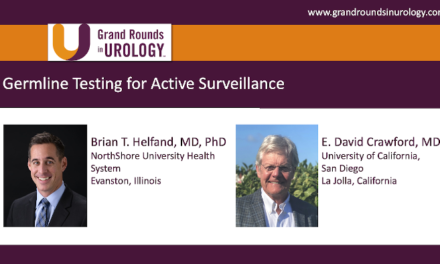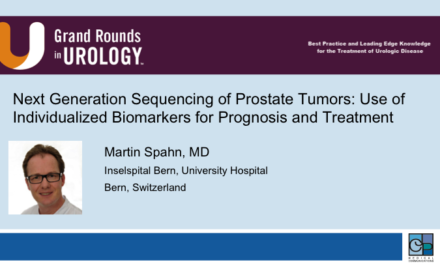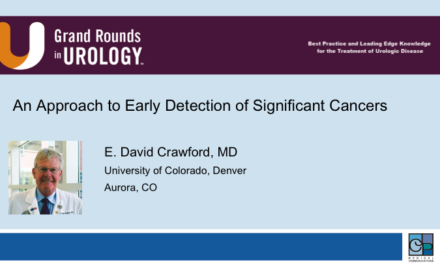Brian T. Helfand, MD, PhD, presented “Genetic Risk Score for Prostate Cancer Screening” for the Grand Rounds in Urology audience in August 2020.
How to cite: Helfand, Brian T. “Genetic Risk Score for Prostate Cancer Screening” August 2020. Accessed Jan 2025. https://dev.grandroundsinurology.com/genetic-risk-score-for-prostate-cancer-screening/
Summary:
Brian T. Helfand, MD, PhD, Chief of the Division of Urology at NorthShore University HealthSystem in Evanston, Illinois, discusses the growing role of genetic assessment in prostate cancer screening, emphasizing the benefits of finding patients’ single nucleotide polymorphism (SNP)-based polygenic risk score (PRS). He acknowledges the roles of family history and testing for rare pathogenic mutations like BRCA2, ATM, and CHEK2, but observes that the former can change over time and be difficult to accurately obtain, while the latter is only relevant to a small percentage of patients. PRS, or genetic risk score, is a number calculated based on the cumulative variation across multiple SNPs, which is then used to provide an easily interpreted estimate of disease risk that is more informative than family history, improves predictive performance, and is significantly associated with both prostate cancer incidence and mortality. Dr. Helfand concludes by noting that there are currently no agreed upon guidelines for timing and frequency of PSA testing, but genetic assessment, and particularly PRS, could clarify who would benefit from early screening.
For more information on genomic testing and prostate cancer, visit our Next Generation Genomics & Biomarkers Learning Center.
ABOUT THE AUTHOR
Brian T. Helfand, MD, PhD, is Chief of the Division of Urology and the Ronald L. Chez Family and Richard Melman Family Endowed Chair at NorthShore University HealthSystem. He is Director of the Personalized Prostate Program and Director of Clinical Research in the Program for Personalized Cancer Care (PPCC). He is also an active surgical scientist who is involved in the care of patients with prostate cancer. His clinical care and research is focused on the implementation of genetic tests and biomarker studies for prostate cancer.
Dr. Helfand completed his undergraduate degree at Emory University. He received his medical training and PhD in Cell and Molecular Biology and Genetics from Northwestern University. He is a fellowship-trained urologic oncologist who has focused his research career on prostate cancer. He was recruited in 2011 from Northwestern University’s Feinberg School of Medicine, where he was faculty in the Department of Urology. Dr. Helfand is an internationally-known urologist and genomic translational researcher. He has received multiple grants from the NIH and has published over 140 peer-reviewed manuscripts in journals such as Nature Genetics, The Journal of Cell Biology, and Science Translational Medicine.
Dr. Helfand is involved in national and international research collaborations as an active member of the International Consortium for Prostate Cancer Genetics (ICPCG), the Prostate Cancer Specialized Program of Research Excellence (SPORE), the IMPACT) study, and the Lower Urinary Tract Dysfunction Research Network (LURN). His current research goals are focused on germline genetic variations and mutations. He is determined to use this information to assist in personal and informed clinical decision making about prostate cancer screening and treatment for patients and their family members.





